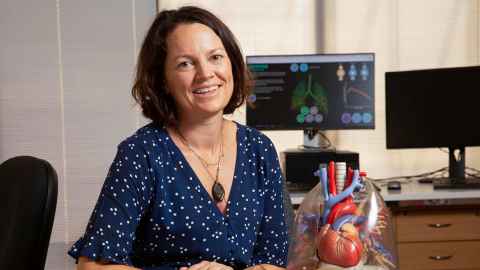ABI awarded $2.8m from Marsden Fund
07 November 2023
Three Auckland Bioengineering Institute research programmes have received almost $3m in this year's Marsden awards round

Three Auckland Bioengineering Institute (ABI) projects in widely different fields have received almost $3 million in the latest round of funding from Te Pūtea Rangahau a Marsden, the Marsden Fund.
Professor Mark Billinghurst was awarded $870,000 for his work on understanding social connections when face-to-face communications are reduced, for example in virtual reality (VR).
“We are looking at what makes people feel connected in face-to-face conversation and whether this be reproduced in VR without the same rich communication cues,” Billinghurst says.
“This will allow us to continue our groundbreaking research on how people synchronise brain activity and non-verbal behaviour in collaborative situations; in particular using virtual reality to conduct studies that would be impossible in the real world.”
The grant will fund a research fellow and several post-graduate students.
Associate Professor Kelly Burrowes receives $942,000 for her work on e-cigarettes. In particular, she and her team are focussing on understanding the role of the lymphatics – often called the forgotten circulation system – in vaping and lung disease.
“There are huge gaps in our knowledge of how lung lymphatics work in health and disease,” Burrowes says. “Studies overseas have recently found that blockages or clots in these lymphatic vessels are important in smoking-related lung disease and Covid-19. We want to find out if the same thing happens with vaping.”
The funding will be used, among other things, to develop computational models which will allow the ABI research team to translate knowledge from rat and mouse models to human physiology.
Dr Hayley Reynolds receives $944,000 for her team’s project to develop a computational model of how fluid moves in the lymphatic system. This is a precursor to understanding more about lymphoedema, an incurable disease involving tissue swelling which develops in up to 20 percent of people who undergo treatment for cancer.
The Marsden funding will be used to acquire new imaging data to accurately inform the team’s models, Reynolds says. It will also allow the researchers to apply new methods to large imaging databases such as those used in deep learning “to shed light on this under-researched disease”.
“With this work we aim to identify new insights into why and how lymphoedema develops in some people, but not in others.”
Getting three Marsden Fund awards in one round is a great achievement says ABI director Professor Merryn Tawhai.
“Marsden funding is hugely competitive, so it is a delight to see this outstanding level of success for three of our research leaders and their teams. The awarded projects are in diverse areas, but all are underpinned by the use of bioengineering technologies to develop new knowledge that will ultimately improve health and wellbeing.”
The University of Auckland received a total of $21.5 million for 31 projects from the Marsden Fund this year.
Media contact:
Nikki Mandow | research communications
M: 021 174 3142
E: nikki.mandow@auckland.ac.nz